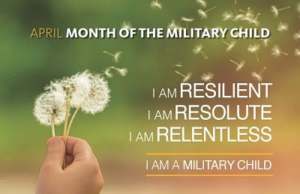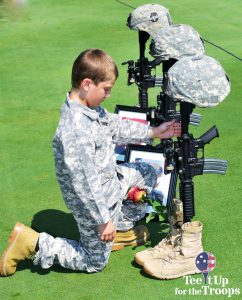Military families are some of the bravest and most enduring families in our country. While we often only think of the deployed person as the one who sacrifices or struggles, the family left behind also faces many difficulties. Some struggles for family members are due to separation, constant moving, added responsibilities put on them while their loved one is away or adjusting to the mental or physical health of a returning servicemember.
COVID-19 Supportive Resources for Military Parents and Children
 We know this is an especially difficult time for our military families, veterans and children during our current COVID-19 crisis. Here are some resources for parents and military children that may be helpful from the Military Child Education Coalition. From different activities you can do with your children, to resources to help discuss what is happening and hopefully ease some of the challenges you’re facing.
We know this is an especially difficult time for our military families, veterans and children during our current COVID-19 crisis. Here are some resources for parents and military children that may be helpful from the Military Child Education Coalition. From different activities you can do with your children, to resources to help discuss what is happening and hopefully ease some of the challenges you’re facing.
The Challenges That Military Children Face
 Family separation can be a very difficult lifestyle for children and spouses/partners of military families, particularly when the separation time is commonly 9-12 months. Spouses/partners, even when not deployed, may be separated for a month or more while completing required training or in the case of injured veterans, when receiving care or rehabilitation.
Family separation can be a very difficult lifestyle for children and spouses/partners of military families, particularly when the separation time is commonly 9-12 months. Spouses/partners, even when not deployed, may be separated for a month or more while completing required training or in the case of injured veterans, when receiving care or rehabilitation.
Family separation also takes a significant emotional toll on children. Military children may worry about the safety or health of their deployed parent or their returning from service parent. Missing their family member can cause children to become anxious, sad, or even clinically depressed, or to begin lashing out in unexpected ways. With very young children, deployment of their parent could even set back developmental milestones like potty training, talking in sentences, or sleeping through the night.
Military life entails moving a lot due to different duty assignments. Relocation can add considerable stress to a family unit due to the necessary transition to another house and community. The family now has to adapt to new schools, jobs, and even friendships. Schools can be a very tough challenge for military children due to the different teaching styles and state school curriculums. Military children may enter a class where they are expected to know a material that they have not been taught. Friendships can also be very difficult for military children who are forced to move frequently because it is challenging to pursue new friendships and “put yourself out there” again and again, especially if another move is likely in the near future.
Finally, there is the added household responsibilities military children may take on when a parent is deployed, which can force a shift in the family dynamic, causing children’s roles and responsibilities to shift as well. This increase in responsibilities for school-aged children, while not innately bad, can result in added stress for military children. Such additional pressure can cause children to feel anxious and even resentful because of the strain they are put under.
The mental health of a returning servicemember also affects children. Combat posttraumatic stress disorder (PTSD) can be transmitted to children from their parents in cases where a parent suffers from combat PTSD. Secondary PTSD can drastically impact a child’s behaviors. Symptoms of combat PTSD in children can range from hyperactivity to extreme withdrawal.
Anxiety is certainly one of the most common symptoms and can be brought about through many of the symptoms experienced by the parent. For example, if a parent re-experiences the trauma, particularly to the point where it feels like it truly is happening again, this is accompanied by fear and anxiety that the child also feels. Children don’t understand what is happening and they may fear the parent cannot take care of them. Being on edge, angry, or aggressive much of the time can make a child fearful and wonder whether the parent loves him or her.
Tee It Up for the Troops Gets Involved – Join In!
At Tee It Up for the Troops, we strive to give back and help even the youngest members of our military families. Our proceeds go to organizations like Beyond the Yellow Ribbon that create meetings and service support opportunities for military members and families. The proceeds also fund recreational and social events for military families and spouses/partners. Plus, Beyond the Yellow Ribbon provides services to military members and families like daycare, counseling, and household repairs.
Visit our website to learn how you can get involved with a Tee It Up for the Troops event in your area.









